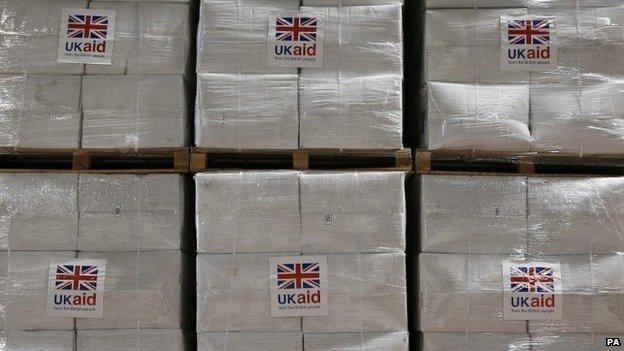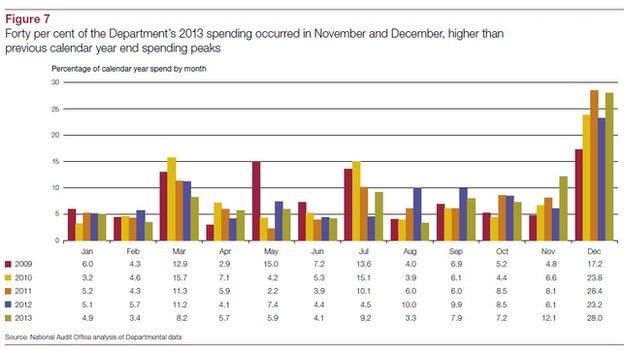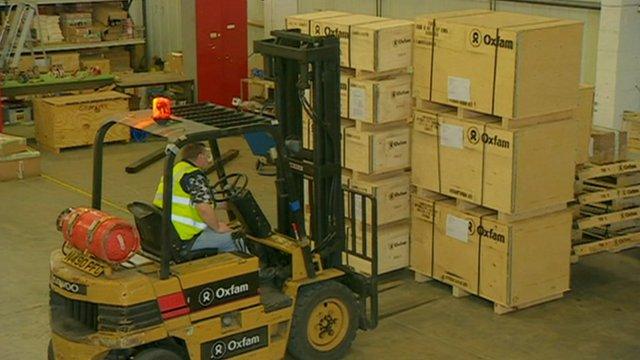£1bn spent 'to meet UK's overseas aid target'
- Published

At least £1bn more than expected was spent on overseas aid in two months to meet the UK's spending target, a watchdog's report says.
The National Audit Office (NAO) said the outlay at the end of 2013 may not have been spent as effectively as possible as a result.
The government is committed to spending 0.7% of the UK's national income on overseas aid.
Officials said aid went only where it was most needed.
The report by the spending watchdog, external said the Department for International Development (DfID) had also requested further cash from the Treasury in 2014 in order to achieve the target.
The NAO said difficulties were caused because the target is based on the calendar year, but the department's accounts work to the end of the financial year in March.
'Little flexibility'
The NAO said: "One clear challenge for the department is that, in effect, it must work to two year-ends.
"This difference is likely to represent more than an accounting difficulty because of the need to hit a target with little or no flexibility, causing significant decisions to be made late in the year and at short notice."
The NAO said the requirement to "hit the target and not exceed it significantly, against a background of considerable uncertainty", presented the department with challenges.

Another complication of the target, it said, was that the actual amount needed to be spent to meet the target can increase or decrease depending on the performance of the economy.
When the Office for National Statistics released new economic data in December 2013 showing that gross national income was likely to be higher than forecast, the department had to increase its spending.
In the last 10 days of the month, it made £95m of payments "in response to urgent need, including payments to fund its response to humanitarian emergencies in the Philippines and Yemen", the report said.
In January 2014, the Department's best estimate was that 2013 ODA totalled £11,415m, the equivalent of 0.703% of its estimate of gross national income, or £44m above the minimum needed to hit 0.7%.
The report said the government increased DfID's 2013-14 budget by a third to support its commitment at a time when it was reducing the budgets of most other departments.
The 0.7% target is based on what the UN urges developed countries to achieve. In 2013 the UK became the first G7 country to do so when it spent £11.5bn on overseas aid.
Sudden changes
An MPs' inquiry into overseas aid spending is being led by International Development Committee chairman Sir Malcolm Bruce.
He said it would be counter-productive if meeting the target led to "unreasonable and unrealistic demands" that resulted in taxpayers' cash being used less effectively.
He said while governments should not be "let off the hook" when it came to aid spending, ways should be looked at to reduce sudden injections of cash.
This could be done by averaging out the 0.7% target over two years, he suggested.
The target has proved controversial at a time of deep cuts in public spending but a bill putting the commitment in law has been approved by MPs.
A DfID spokesman said the department was experienced at dealing with sudden changes in spending patterns, such as responding to humanitarian disasters.
He added: "In 2013, the UK became the first G7 country to meet the UN target.
"Investing in overseas development is creating a world that is healthier, more stable and increasingly prosperous and that is something Britain can be proud of.
"UK aid goes only where it is most needed and where it will deliver the very best results for taxpayers' money."
- Published25 July 2013

- Published9 November 2012

- Published17 February 2013
